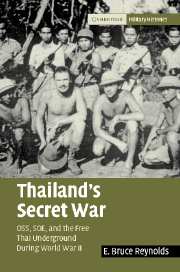Book contents
- Frontmatter
- Contents
- List of illustrations
- List of maps
- Preface
- Acknowledgments
- Notes on names and transliteration
- Prologue
- 1 The origins of the Free Thai movement
- 2 The China tangle
- 3 Chamkat and the Allies
- 4 Showdown in Friendship Valley
- 5 Frustrated hopes
- 6 Contact at last
- 7 The OSS commits to Pridi
- 8 Pridi's bid for national redemption
- 9 Arming and training the underground
- 10 The end game
- Epilogue
- Bibliography
- Index
5 - Frustrated hopes
Published online by Cambridge University Press: 28 July 2009
- Frontmatter
- Contents
- List of illustrations
- List of maps
- Preface
- Acknowledgments
- Notes on names and transliteration
- Prologue
- 1 The origins of the Free Thai movement
- 2 The China tangle
- 3 Chamkat and the Allies
- 4 Showdown in Friendship Valley
- 5 Frustrated hopes
- 6 Contact at last
- 7 The OSS commits to Pridi
- 8 Pridi's bid for national redemption
- 9 Arming and training the underground
- 10 The end game
- Epilogue
- Bibliography
- Index
Summary
General Donovan's visit to Asia brought a number of significant changes that would affect the OSS Thailand operation. He had re-ordered SACO, laid the groundwork for a new OSS unit attached to Chennault's 14th Air Force, replaced Eifler, and boosted the position of OSS in the India-based Southeast Asia Command. Most importantly, Donovan had vetoed Tai Li's P'uerh operation, apparently clearing the way for the Free Thai mission to pursue its main task of penetrating Thailand for intelligence gathering.
Donovan's visit took place at a time of strain in the broader relationship between the United States and China. Although his participation in the Cairo Conference had boosted Chiang Kai-shek's prestige, soon after returning to Chungking he learned that the Allies had backed away from promises of an offensive in Burma, citing pressing needs for vital equipment in other theaters. The angry Chinese leader demanded a one billion dollar loan in a 9 December 1943 letter to President Roosevelt.
Relations were no happier among the Americans and Chinese in Friendship Valley after Donovan's departure, despite positive reports from Hoffman, the aide Donovan left behind to implement the changes he had demanded in the SACO agreement. Miles advised Metzel, his Washington liaison, in a 10 December 1943 message, that Donovan's visit had “caused a whole lot of hard feelings.” Noting that Hoffman and Colonel Hsiao had engaged in shouting matches during their negotiations, Miles complained the former was “not helping things at all.” Soon Miles' subordinates were describing Hoffman as the “upstart.”
- Type
- Chapter
- Information
- Thailand's Secret WarOSS, SOE and the Free Thai Underground During World War II, pp. 158 - 195Publisher: Cambridge University PressPrint publication year: 2005

